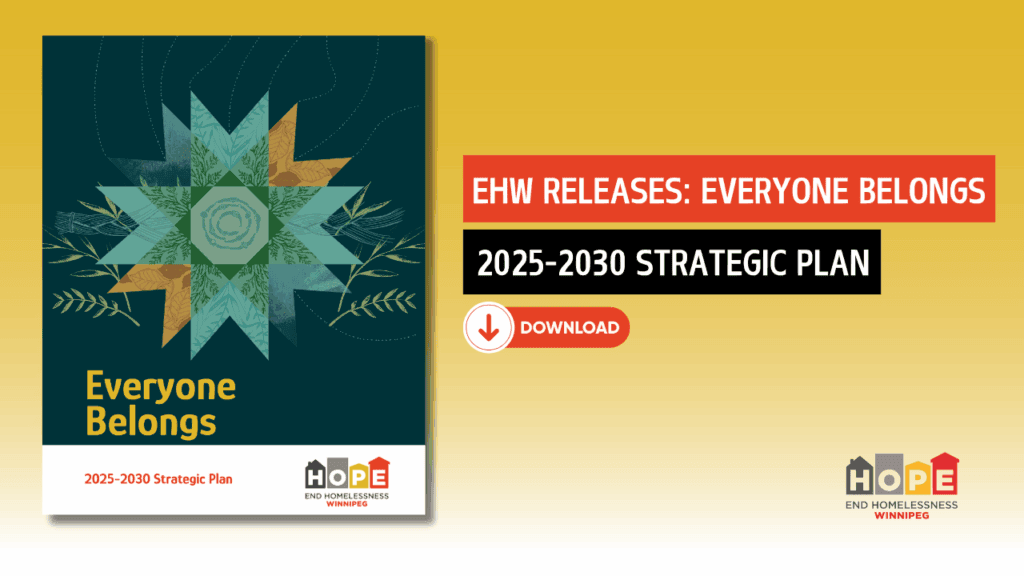MEDIA RELEASE
For Immediate Release
August 28, 2024
2024 Winnipeg Street Census Reflects National Rise in Homelessness
Winnipeg, MB – End Homelessness Winnipeg has released the results of the 2024 Winnipeg Street Census (Point-in-Time Count), showing a sharp rise in homelessness locally that mirrors increases seen across Canada. The count, done over 5 days found that on November 5, 2024, 2,469 people were experiencing homelessness in Winnipeg, nearly double the 1,256 counted in 2022, and the highest figure in the city’s 10-year Street Census history.
Winnipeg’s Point-In-Time Count was funded by the Government of Canada and conducted in partnership with the provincial, city and Indigenous governments, community organizations, and lived experts, alongside more than 70 communities nationwide that participated in the 2024 coordinated Point-in-Time Count.
Key Findings from the 2024 PiT Count
- 2,469 people were experiencing homelessness in Winnipeg on November 5, 2024.
- 79.9% identified as Indigenous, with First Nations, Métis, Inuit, and other Indigenous peoples significantly overrepresented.
- Youth, older adults, and newcomers accounted for a growing share of those surveyed.
- The most common reasons for housing loss included low income, eviction, substance use, conflict, and discrimination.
- Nearly 68% were chronically homeless, having experienced homelessness for six months or more within the past year.
Like other Canadian cities, Winnipeg’s data highlights persistent systemic pathways into homelessness, including discharges from child welfare, health, and justice systems.
What Needs to Be Done
The 2024 Winnipeg Street Census identifies clear priorities to help reduce homelessness:
- Expand financial, mental health, and substance use supports to meet the scale of need.
- Invest in family supports and family reunification programs to prevent homelessness before it begins.
- Develop transitional housing for Indigenous people moving to Winnipeg for education, work, health, or emergencies.
- Strengthen federal–provincial collaboration to increase investments in Indigenous housing and supports both on- and off-reserve.
- End discharges into homelessness from hospitals, child welfare, and justice systems.
- Ensure these institutions provide release planning, support services, and housing options so people do not return to homelessness.
“These numbers represent real people – relatives, neighbours and friends who deserve dignity, safety and stability. These findings tell us that homelessness is preventable. It is the outcome of systemic gaps we can address,” said Justin Woodcock, on behalf of the Board of Directors of End Homelessness Winnipeg. “The Street Census gives us a roadmap and challenges us as a community to respond with urgency and compassion.”
The Honourable Bernadette Smith, Minister of Housing, Addictions, Homelessness and Mental Health, Province of Manitoba, brought greetings on behalf of the Province. She spoke about her own family’s early experiences of homelessness and the importance of ensuring people have the right supports to stabilize and succeed.
“Homelessness is complex, shaped by poverty, trauma, discrimination, and the intergenerational impacts of colonization,” said Minister Smith. “That’s why our government launched Your Way Home, a strategy not only to secure housing but to ensure people have the wraparound supports needed to maintain it from family reunification to education, skills training, and healing.”
Minister Smith highlighted recent provincial investments in affordable housing, including a commitment to dedicate 20% of Manitoba Housing units to a Housing First model with wraparound supports. She also emphasized the importance of partnership, noting collaborations with End Homelessness Winnipeg, municipal governments, the federal government, and community organizations.
“This is heart work. It takes all of us: governments, service providers, and community members working together with compassion. Most importantly, we thank the people with lived experience who continue to share their stories and guide us in building solutions. Our priority is clear: getting people out of tents and into safe homes, with the services they need to live full and successful lives. No one in this country should be without a home.”
Adding the perspective of lived experience, Ash Burkowski, a Street Census Steering Committee member and lived experience advisor, underscored the urgency of collective action:
“The true measure of a society is how it treats its most vulnerable members. The Street Census is more than data, it is the voices of our relatives, shared with hope and urgency, asking us to listen and act. With this report, Winnipeg faces a choice: will we lead with compassion, cooperation, and a commitment to the common good, or will we allow inaction to deepen the crisis? We need accessible, affordable housing, adequate incomes, and wraparound supports for mental health, recovery, and healing. The people who shared their stories trusted us to carry them forward, and it is now up to leaders and all of us as a community to act with courage and compassion.”
Al Wiebe, lived experience advocate and host of the radio show Of No Fixed Address, reinforced the human impact of homelessness and the importance of the Street Census:
“I spent 29 months on the streets, and there is nothing redeeming about being homeless. That experience left a hole in my heart, but also a fire to help others. The Street Census matters because it doesn’t just count numbers, it tells us why people are out there, whether due to mental health, addictions, poverty, or systemic failures. We cannot change policy unless we understand the reasons. Just as important, the Census changes perceptions. Volunteers who meet people on the streets for the first time often return transformed, realizing that those experiencing homelessness are no different than any of us. That awareness is powerful. It is how change begins.”
About the Winnipeg Street Census
The Winnipeg Street Census (Point-in-Time Count) has been conducted in 2015, 2018, 2021, 2022, and 2024. Along with data from over 70 communities across Canada, it provides one of the few reliable sources of information on unsheltered homelessness and informs the development of policies, programs, and advocacy to prevent and end homelessness. The next Winnipeg Street Census will be conducted in fall 2025, with results expected in winter 2026.
Please download a copy of the 2024 Winnipeg Street Census Report and infographics.
-30-
Media Contact
Oraye St. Franklyn




